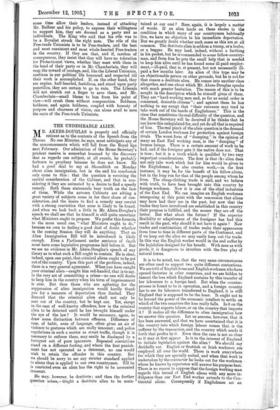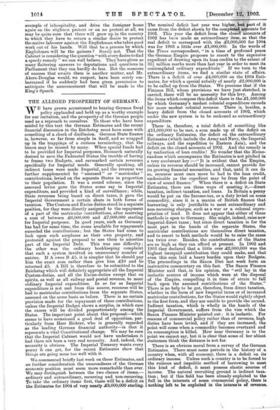THE UNDESIRABLE ALIEN.
MR. AKERS-DOUGLAS is properly and officially reticent as to the contents of the Speech from the Throne. No one Minister, he says, must anticipate any of the announcements which will fall from the Royal lips next February. Our admiration of the Home Secretary's prudent reserve is somewhat lessened by the discovery that as o one subject, at all events, he probably forbears ta prophesy because he does not know. He had a good deal to say at Shoreditch on Monday about alien immigration, but in the end his conclusion only came to this : that the question is receiving the careful consideration of the Cabinet, and that in con- sidering it they are animated by a desire to find a speedy remedy. Both these statements hear truth on the face of them. While the autumn Cabinets are sitting a great variety of subjects come in for their share of con- sideration, and the desire to find a remedy may coexist with a strong conviction that none is likely to be found. And when we look back a little in Mr. Akers-Douglas's speech we shall see that he himself is still quite uncertain what Ministers ought to propose. We prefer this formula to the more usual one, "what Ministers ought to do," because we own to feeling a good deal of doubt whether in the coming Session they will do anything. That an Alien Immigration Bill will be introduced is likely enough. Even a Parliament under sentence of death must have some legislative programme laid before it. But we see no evidence in Mr. Akers-Douglas's speech of any theory as to what such a Bill ought to contain. He is clear, indeed, upon one point, that criminal aliens ought to be got out of the country. Upon this part of the problem, indeed, there is a very general agreement. When you have caught your criminal alien—caught him red-handed, that is to say. in the very act of committing a crime—no one will desire to keep him in the country when his term of imprisonment is over. But then those who are agitating for the suppression of alien immigration would hardly thank you for a measure of deportation thus limited. They demand that the criminal alien shall not only be sent out of the country, but be kept out. Yet, except in the case of well-known offenders, how is the criminal alien to be detected until he has brought himself under the eye of the law ? It would be necessary, again, to draw some distinction between offences. Difference of race, of habit, even of language, often gives an air of violence to gestures which are really innocent ; and police regulations in such a matter as street traffic, though it is necessary to enforce them, may easily be disobeyed by a foreigner out of pure ignorance. Repeated convictions stand on a different footing, and where the first punish- ment has not operated as a deterrent, no one would wish to retain the offender in this country. But we should be sorry to see any stricter standard applied to aliens than is applied to our own countrymen. Till he is convicted even an alien has the right to be accounted innocent.
He may, however, be destitute ; and then the further question arises,—Ought a, destitute alien to be main- tained at our cost ? Here, again, it is largely a mattei of words. If an alien lands on these shores in the condition in which many of our countrymen habitually live, we have no objection to his immediate deportation. But we greatly doubt whether such cases as this are at all common. The destitute alien is seldom a tramp, or a loafer, or a beggar. He may land, indeed, without a farthing in his pocket, but he is commended to some fellow-country- man, and from him he gets the small help that is needed to keep him alive until he has found some ill-paid employ- ment,—ill-paid, that is, at present, but not necessarily ill- paid a few months later. An alien of this type may be an objectionable person on other grounds, but he is not for that reason a destitute alien. He comes into another class • altogether, and one about which Mr. Akers-Douglas speaks with much greater hesitation. The reason of this is to be sought in the description which he himself gives of them. They are "hard-working men and, so far as social order is concerned, desirable citizens " ; and against them he has nothing to say except that "their entrance may tend to take work out of the hands of Englishmen." This is the class that constitutes the real difficulty of the question, and the Home Secretary will be deceived if he thinks that he can leave this unlegislated for, and yet do all that is required of him. The real pinch of the alien question is the demand of certain London workmen for protection against foreign rivals. The worst form of "dumping," in the opinion of many an East End working man, is the " dumping " of human beings. There is a certain amount of work to be had, and if the foreigner gets it the native does not. That is true ; but it is a truth which is qualified by two very important considerations. The first is that I h-3 alien does not only take work which but for him would be given to the Englishman ; he also creates work,—in the first instance, it may be, for the benefit of his fellow-aliens, but in the long run for that of the people among whom he lives. The cheap-clothing trade is said, and we believe with truth, to have been brought into this country by foreign workmen. Now it is one of the chief industries of the East End. We can imagine an English workman interposing at this point with the concession that aliens may have had their use in the past, but now that the trades they have introduced are established in this country their purpose is fulfilled, and the sooner they are off the better. But what about the future ? If the superior flexibility or adaptiveness of the foreigner has had this result in the past, why should it not have it again ? New trades and combinations of trades make their appearance from time to time in different parts of the Continent, and if we keep out the alien we may easily keep out the trade. In this way the English worker would in the end suffer by the legislation designed for his benefit. With men as with goods, it is dangerous to interfere with the free play of natural forces.
It is to be noted, too, that the very same circumstances are often used to support two quite different contentions. We are told of English firms and English workmen who have opened factories in other countries, and we are bidden to lament the loss which England sustains by this transfer of her labourers to a foreign land. But when the counter- process is found to be in operation, and a foreign country has to see its labourers transferred to England, it is still England that is supposed to be the loser. It ought not to be beyond the power of the economic intellect to settle on which of the two countries the loss really falls. Is it on the country that exports labour, or on the country that imports it ? It makes all the difference to alien immigration how we answer this question. Let us assume, however, that it has been answered, and that we have ascertained that it is the country into which foreign labour comes that is the, sufferer by the transaction, and the country which sends it forth that profits by it. Even then the case is not so clear as it may at first appear. Is it to the interest of England to initiate legislation against the alien ? We should say decidedly not. English or Scottish or Irish workmen are employed all over the world. There is work everywhere for which they are specially suited, and when that work is undertaken by the contractor he looks out for the workmen - whom he knows by experience will answer his purpose best. There is no reason to suppose that the foreign working man regards this inroad of English aliens with any more in- dulgence than our East End worker extends to the Con- tinental aliens. Consequently if Englishmen set an example of inhospitality, and drive the foreigner home again on the slightest pretext or on no pretext at all, we may be quite sure that there will grow up in the country to which they have to return a similar desire to protect the native labourer against the Englishman who takes good work out of his hands. Will that be a process by which Englishmen will be the gainers ? Surely not. That the Cabinet is considering the question "with every desire tofind a speedy remedy" we can well believe. They have given so many flattering answers to deputations and questions in Parliament that they can hardly do less. But the measure of success that awaits them is another matter, and Mr. Akers-Douglas would, we suspect, have been sorely em- barrassed if he suddenly had been given permission to anticipate the announcement that will be made in the King's Speech.



























































 Previous page
Previous page